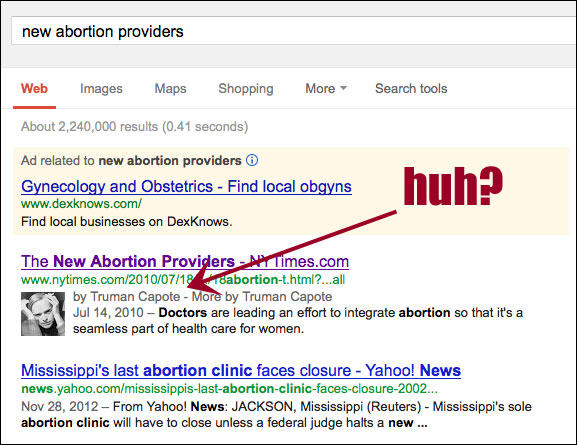If you ever scan links in Google News search results, you might have noticed articles paired with the names and photos of the authors who wrote them. Those are links to the authors' Google+ profiles, part of Google's attempt to bake its social network into all the ways you interact with Google services.
If an author hasn't taken steps to connect their stories to a Google+ profile, the story link in Google search results isn't paired with a Google+ page—except when Google's sometimes overactive algorithms take matters into their own hands. That's what just happened with a New York Times story about abortion, which was credited to Truman Capote—the famous author of Breakfast at Tiffany's and In Cold Blood who died in 1984:

Search Engine Land has the full story on this one. The Times article is from 2010 and was titled "The New Abortion Providers." It was written by Emily Bazelon, who has a Google+ account but may not have gone through Google's official process for linking that account to her articles. But her one-sentence bio at the end of the New York Times story notes that Bazelon was "the Truman Capote law-and-media fellow at Yale Law School."
That was enough for Google results to show Truman Capote as the author of the story and provide a link to a Truman Capote account someone made on Google+ (which now seems to have been deleted). You would have seen the odd pairing of article and author if you were searching Google for abortion-related stories, but Google has now fixed things on the backend such that Capote is no longer credited as the NYT article author.
In a statement to Search Engine Land, a Google spokesperson said, “We want to help users see who’s writing the content they find on the Web and engage directly with authors. To that end, earlier this year we began algorithmically identifying authors in some cases. We still encourage authors to add explicit authorship markup and verify their email addresses to provide the most comprehensive and accurate data.”
I've seen numerous Ars articles attributed in Google results to the wrong authors, but in those cases they were at least attributed to another Ars author. With Google increasing automatic pairing of articles and authors, it's likely the Capote mistake won't be the last. But for sheer strangeness, it will be hard to top Google crediting an article to someone who died 27 years before Google+ existed.
reader comments
12